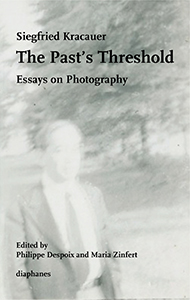Siegfried Kracauer was a leading intellectual figure of the Weimar Republic and one of the foremost representatives of critical theory. This volume brings together for the first time all of Kracauer's essays on
photography that he wrote between 1927 and 1933. It includes a foreword by
Philippe Despoix, and a curriculum vitae illustrated with photographs from the Kracauer estate.
Siegfried Kracauer was a leading intellectual figure of the Weimar Republic and one of the foremost representatives of critical theory. Best known for a wealth of writings on sociology and
film theory, his influence is felt in the work of many of the period's preeminent thinkers, including his friends, the critic Walter Benjamin, and Theodor W. Adorno, who once claimed he owed more to Kracauer than any other contemporary.
The volume brings together for the first time all of Kracauer's essays on photography that he wrote between 1927 and 1933 as a journalist for the
Frankfurter Zeitung, as well as an essay that appeared in the
Magazine of Art after his exile in America, where he would spend the last twenty-five years of his life. The texts show Kracauer as a pioneering thinker of the photographic medium in addition to the important historian, and theorist, of film that he is acknowledged to have been. His writings here build a cohesive theory on the affinities between photography, memory and history.
With a foreword by Philippe Despoix offering insights into Kracauer's theories and the historical context, and a
Curriculum vitae in pictures, photographs from the Kracauer estate annotated by Maria Zinfert.
A German sociologist, philosopher, journalist and
film and
photograph theorist, Siegfried Kracauer (1889-1966) was a leading figure on the Weimar arts scene and one of the foremost representatives of the Frankfurt School of critical theory. Best known for a wealth of writings on sociology and film theory, his influence is felt in the work of many of the period's preeminent thinkers, including the critic Theodor W. Adorno, who once claimed he owed more to Kracauer than any other intellectual.

